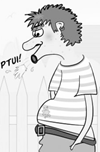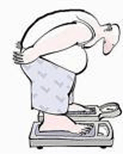Miscellaneous hints and tips
Saliva, spitting and a bucket
Most people swallow - roughly 1,100 times a day - to clear their mouths of excess saliva. In Alex's case, this swallowed saliva would accumulate in his constricted oesophagus. Although he was embarrassed at doing it and was constantly apologising, he would have to "clear his throat" frequently into a tissue as he could not risk the bacteria-filled fluid going down into his lungs and triggering another bout of pneumonia.

Sometimes there was a lot of this saliva and many tissues used. Therefore, it was easier and safer to have a bucket lined with a used carrier bag or small bin liner beside him for the used tissues or, on occasion, he would have to spit straight into the bucket as there was no time for tissues. The carrier bag could then be disposed of easily and bucket rinsed for the next time.

The bucket would also be on the floor beside him at the dining table for when food got stuck in his oesophagus. Previously he would go to the bathroom to clear it by putting his fingers down his throat to regurgitate the stuck food. However, the movement in getting to the bathroom often prompted further problems, so we started to employ the bucket by the table. If you think this offensive, just imagine what happens to the dignity of the dysphagic patient when he/she has to regurgitate food in this way for fear of choking. This is acceptable, necessary spitting. If you cannot face it, look away, but stay in the room in case an emergency develops.
Medication
Alex was on numerous types of medication. Eventually we found tablets, even small ones, would not go down so our GP prescribed solutions or dispersible tablets – many prescriptions are available in this form, so do speak to your GP. If you are hospitalised for any reason, do take these "liquid" medications and a list with you as most wards do not stock them and the hospital pharmacy may not be open when you need to take a dose.
Weight

Alex used to weigh himself daily and we would record the readings in a little notebook. Although a person's weight will fluctuate from day to day for numerous reasons, the notebook enabled us to spot a downward trend and then we could adjust Alex's intake and/or enrichment of food.
Miscellaneous
DO ASK FOR HELP - whether it is from a friend, relative or medical professional.
It may be that you, as the carer, need an hour's respite or to go food shopping. A friend may be able to sit with the patient until you return. If not, and you have access to a computer (or a friend can help you), get a supermarket to deliver your shopping.
Many pharmacies offer a home delivery service for prescriptions. Ask them for details.
If weight becomes a problem, speak to your GP who may be able to help or refer you to a dietician.
If pressure sores start to develop following weight loss and immobility, a district nurse arranged through your GP may be able to lend you a Propad cushion for chairs and a special mattress which help alleviate sores. They can often help with mobility aids too and general support in what can be a difficult situation.

Have useful telephone numbers list by the phone – doctor's surgery, local pharmacy, district nurses weekday and out-of-hours numbers, out-of-hours GP, NHS direct etc.
Don't abuse any of these forms of help, but don''t suffer in silence either – it will not help the dysphagic patient in the long run.